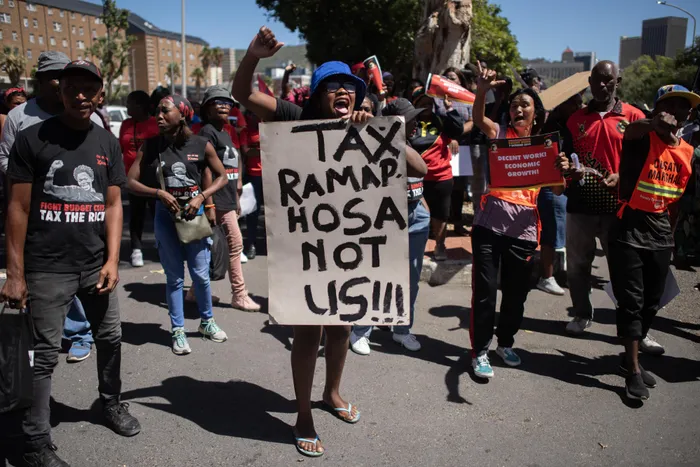GNU's Budget 3.0: A Call to Serve the Nation Beyond Partisan Politics

Protesters demonstrating against proposed budget and social funding cuts ahead of Finance Minister Enoch Godongwana's first budget speech in Cape Town on February 21, 2024. The revised budget brings into sharp focus the urgent need for renewed unity and strategic focus within South Africa’s Government of National Unity, says the writer.
Image: AFP
Dr. Paul Kariuki
South Africa’s budget process reflects the nation’s ongoing struggle to balance economic growth, social development, and fiscal responsibility.
From the first budget speech delivered by the government of national unity, the focus has been on addressing systemic inequalities, promoting economic recovery, and stabilising public finances. The initial budgets aimed to allocate resources transparently to priority sectors such as health, education, and infrastructure, while attempting to manage the nation’s substantial debt burden.
Over the years, the government of national unity faced multiple economic challenges—ranging from global economic shocks to domestic issues like corruption, inefficient resource management, and sluggish growth. These issues necessitated constant fiscal recalibration, leading to successive adjustments and, ultimately, the recent revised budget. The revised budget reflects a pragmatic response to unforeseen economic realities, including reduced revenue collection, rising social welfare obligations, and mounting debt servicing costs. It embodies the government’s attempt to sustain service delivery while safeguarding fiscal stability amid uncertain times.
The revised budget underscores serious challenges in meeting the fiscal deficit target. Economically, South Africa faces sluggish growth, partly impacted by global downturns, declining commodity prices, and domestic structural issues. Tax revenues have fallen short due to weakened economic activity, leading to lower income, corporate, and value-added tax collections. Simultaneously, expenditure pressures have increased, notably social grants, health services, and debt repayments, driven by the need to cushion vulnerable populations from economic shocks and maintain social stability.
Managing inflationary pressures and currency volatility worsens the deficit dilemma. The government’s borrowing to fill fiscal gaps raises concerns about debt sustainability, especially if economic growth does not recover swiftly. Political challenges exacerbate the issue—delays in implementing structural reforms, resistance from vested interests, and governance issues hamper efforts to diversify the economy and improve revenue streams.
The accumulated impact is a widening budget deficit, increased public debt, and declining investor confidence. As fiscal space shrinks, the government faces the tough task of balancing immediate socio-economic needs with long-term fiscal discipline, which could threaten social stability and economic progress if not handled prudently.
Addressing the mounting deficit requires strategic, multi-faceted interventions.
First, broadening the tax base is crucial. This involves closing loopholes, improving tax compliance, and possibly introducing new revenue streams without overburdening the poor or middle class. Strengthening revenue collection agencies and reducing illicit financial flows can also improve government income.
Second, expenditure prioritisation is essential. The government must focus on efficient resource allocation—investing in growth-enhancing sectors such as infrastructure, technology, and education—while cutting non-essential or inefficient spending. Implementing austerity measures transparently and equitably can help restore fiscal credibility without deepening inequality.
Third, improving governance and curbing corruption are imperative. Strengthening institutions, promoting accountability, and increasing transparency will ensure that public funds are used effectively. Fighting corruption and wasteful expenditure can yield significant savings, which can be redirected to vital sectors.
Fourth, fostering economic diversification and growth-oriented policies can expand the revenue base. Encouraging investments, supporting small businesses, and reducing regulatory bottlenecks can stimulate economic activity, create jobs, and ultimately improve fiscal health.
Finally, engaging with international financial institutions for technical and financial support can bolster fiscal reforms. Making credible commitments to fiscal discipline will build investor confidence, lower borrowing costs, and create room for targeted growth initiatives.
In conclusion, the revised budget brings into sharp focus the urgent need for renewed unity and strategic focus within South Africa’s Government of National Unity. The challenges of meeting the budget deficit are formidable, but they are not insurmountable. Successful management relies on collective action rooted in the national interest.
It is incumbent upon all members of the government, regardless of party affiliation, to prioritise the stability and prosperity of South Africa above political differences. Leadership must commit to transparent, responsible fiscal management and pursue reforms that balance social needs with economic sustainability. Unity of purpose is vital; only through genuine cooperation, shared sacrifice, and a focus on the common good can the nation navigate this fiscal adversity effectively.
Let us remember that sustainable economic and social progress depends on governments acting with integrity and resolve. I call on all policymakers, civil servants, and political leaders to put aside partisan interests, uphold their oath to serve the nation, and work collaboratively to ensure South Africa’s fiscal future is resilient, equitable, and prosperous for generations to come.
* Dr. Paul Kariuki is the Executive Director of the Democracy Development Program (DDP) and writes in his personal capacity.
** The views expressed do not necessarily reflect the views of IOL, Independent Media or The African.